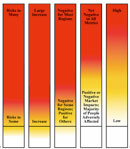Fifteen scientists from the Intergovernmental Panel on Climate Change (IPCC) have published a controversial graph — which was dropped from the 2007 IPCC report — depicting the risks associated with rising temperatures. Known as the “burning embers” diagram, the color-coded graph shows far more serious environmental and social risks likely to occur with more modest temperature increases than projected in a graph used in the IPCC’s third report, issued in 2001. The revised graph shows a substantial risk to unique and threatened ecosystems, such as tropical glaciers and coral reefs, as temperatures rise 1 to 3 degrees C (1.8 to 5.4 F), as well as a significantly larger risk of extreme weather events. The risk of so-called “large-scale discontinuities” — such as extensive melting of ice sheets in Greenland or West Antarctica — also becomes significant with a 3 degree C temperature increase, a lower threshold than projected in 2001. Writing in the journal Proceedings of the National Academy of Sciences, the 15 scientists said the revised risk assessment reflects recent evidence of significant climate impacts occurring with even modest temperature rises. The burning embers graph was left out of the IPCC’s Fourth Assessment Report in 2007 because some scientists considered it too vague and some governments thought it was alarmist.
`Burning Embers’ GraphRevised to Show Higher Warming Risks
More From E360
-
ANALYSIS
Overshoot: The World Is Hitting Point of No Return on Climate
-
Solutions
In Hunt for Rare Earths, Companies Are Scouring Mining Waste
-
Oceans
Sea Star Murder Mystery: What’s Killing a Key Ocean Species?
-
Solutions
Plagued by Flooding, an African City Reengineers Its Wetlands
-
WATER
After Ruining a Treasured Water Resource, Iran Is Drying Up
-
FILM
At a Marine Field Station, Rising Seas Force an Inevitable Retreat
-
Energy
To Feed Data Centers, Pennsylvania Faces a New Fracking Surge
-
SPACE
Scientists Warn of Emissions Risks from the Surge in Satellites
-
WILDLIFE
A Troubling Rise in the Grisly Trade of a Spectacular African Bird
-
Energy
In Myanmar, Illicit Rare Earth Mining Is Taking a Heavy Toll
-
INTERVIEW
How Batteries, Not Natural Gas, Can Power the Data Center Boom
-
ANALYSIS
As U.S. and E.U. Retreat on Climate, China Takes the Leadership Role
